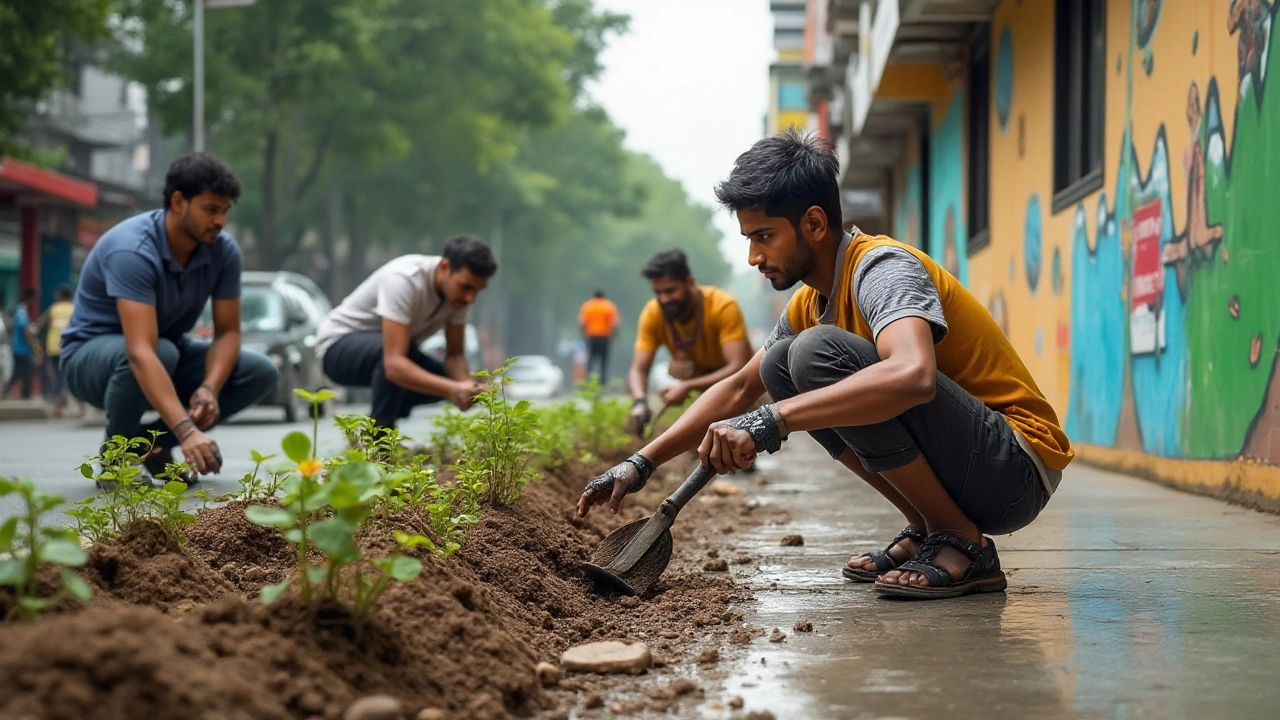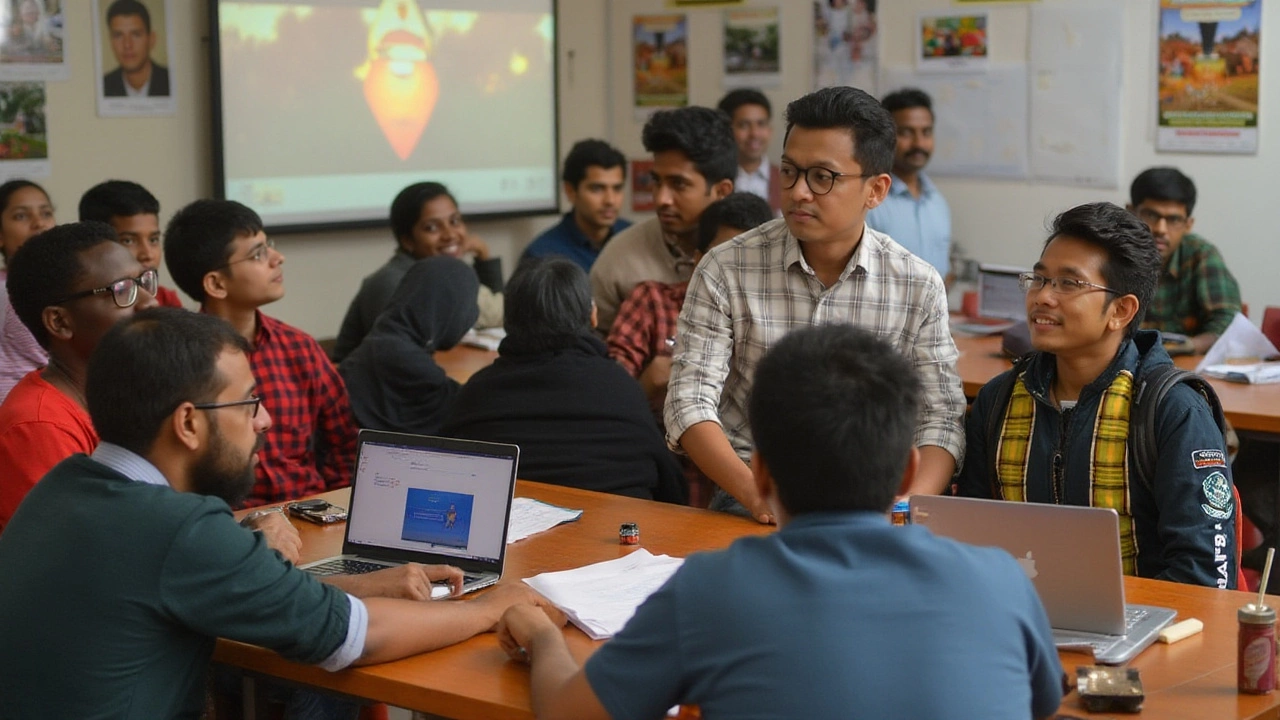The Impact and Benefits of Volunteering: A Deep Dive
 Jan, 31 2025
Jan, 31 2025
Volunteering has become an integral part of our society. It offers a unique opportunity for individuals to give back to their communities, learn new skills, and promote positive change. But have you ever wondered what makes it so rewarding?
Diving into the world of volunteering, you’ll discover countless benefits that extend beyond just those who are directly helped. For many, it's a path that contributes to personal growth and a sense of purpose.
Whether you're across the globe or in your neighborhood, volunteers are making significant impacts worldwide.
In the following sections, we'll explore how volunteering can nurture personal development, strengthen communities, and even benefit your career. These insights will not only help you understand its importance but will also guide you on how you can start making a difference today.
- The Personal Joy of Helping Others
- Enhancing Career and Skills
- Building Stronger Communities
- Health and Well-being Benefits
- Global Volunteering: Making a Difference Worldwide
- How to Get Started with Volunteering
The Personal Joy of Helping Others
Volunteering offers a unique kind of satisfaction that is difficult to find elsewhere. It's a joy that comes from the simple act of giving without expecting anything in return. Those who have engaged in community service often speak of a deep, intrinsic reward that accompanies their altruistic endeavors. This reward isn't just a psychological lift; it often involves cultivating a sense of belonging and purpose. By dedicating time and energy to help others, individuals tap into their innate human need to connect and contribute to society. In the hustle and bustle of our daily lives, it's easy to overlook the simple joys that make life meaningful. Volunteering provides an opportunity to step outside oneself and experience the profound satisfaction that comes from selfless actions.
People often cite emotional rewards when they engage in volunteering benefits. Studies suggest that helping others can release endorphins, the brain's natural painkillers, leading to what's often referred to as a 'helper's high'. This sensation parallels the feelings encountered by athletes during intense physical activities. The satisfaction derived from volunteering is partly because it meets our psychological needs. It allows us to experience compassion and creates a bond with others we might otherwise never meet. These encounters help create a tapestry of shared understanding and empathy across different walks of life.
"Service to others is the rent you pay for your room here on earth," – Muhammad AliAs we find ourselves increasingly connected online yet disconnected in reality, volunteering bridges that gap, creating face-to-face connections in a seemingly isolating world. It allows us to be part of something greater than ourselves and shift our focus away from the stresses of everyday life. When we step outside our own experiences to help those around us, we contribute to a ripple effect of kindness that can extend far beyond our immediate circles.
In addition to these individual rewards, there’s a reciprocal relationship between volunteers and the communities they support. Not only do they offer help, but they often return with new understanding and appreciate different perspectives. This cycle of giving and growing creates communities that are more cohesive and resilient. Volunteer efforts bolster the social fabric that binds us, nurturing a collective strength that proves invaluable in times of need. It's essential to remember that amidst the hustle of work commitments and personal responsibilities, carving out time for community service is not just beneficial for the recipients but deeply fulfilling and rewarding for the volunteers themselves.
Enhancing Career and Skills
Volunteering is more than just giving back; it can be an avenue to bolster your career and hone your skills. When you step into a volunteer role, you often find yourself in environments that allow you to learn and develop in ways you might not expect. This aspect is what makes volunteer opportunities so enriching. Not only do you bring value, but you also gain invaluable experiences that can propel your career forward in leaps and bounds.
One of the most attractive aspects of volunteering is the unique set of skills you can acquire. Imagine you're volunteering at a local non-profit; you may find yourself taking on a leadership role during a fundraising event. This experience could teach you how to effectively organize a team, set clear goals, execute plans, and see them to fruition. Skills such as these are easily transferable to any workplace, making you a more compelling candidate for potential employers.
Additionally, volunteering allows you to work in diverse environments where you'll interact with people from various walks of life. This exposure can enhance your communication skills, teach you how to navigate different cultural dynamics, and improve problem-solving abilities. These are all crucial soft skills that are often highlighted on resumes and discussed in interviews.
Data shows that employers are increasingly valuing the experiences gained through volunteering. A study conducted by the Corporation for National and Community Service found that volunteering can increase a person’s chances of finding employment in their chosen field by up to 27%. This figure demonstrates the power of volunteering in expanding professional networks and opening doors that you might not find in traditional job settings.
"Volunteering immeasurably enriches your perception, broadens your social horizons, and equips you with the confidence to take risks in your professional journey," writes Richard Weissbourd, a senior lecturer at Harvard's Graduate School of Education.
In addition to the personal and professional development aspects, volunteering is also about tailoring your experiences to your career path. For instance, if you're an aspiring writer, lending your skills to a charity’s newsletter can help you refine your writing ability while also building a portfolio. On the other hand, if you're interested in healthcare, volunteering at a local hospital could provide exposure to the medical field and maybe even mentorship opportunities from seasoned professionals.
Volunteering can also help you explore fields you may be curious about before committing. This risk-free exploration provides a hands-on experience that can affirm your interest or redirect your career path altogether. By taking that step, you're investing in your growth, much like an internship, but often with a more altruistic bent.
The notion of volunteering isn't just about charity work; it's a strategic move towards broadening one's skillset and enhancing career possibilities. For those who recognize its potential, volunteering becomes a transformative journey that blends professional growth with personal satisfaction.

Building Stronger Communities
Volunteering plays a pivotal role in the development and fortification of communities. It acts as the glue that brings people together, binding them through shared goals and aspirations. When individuals commit their time and resources to community service, we witness the true power of human collaboration. These acts of kindness address immediate needs and also lay the groundwork for a supportive, interconnected network that benefits everyone. When a community embraces such altruistic efforts, it is not only enriched culturally and socially but also becomes more resilient in facing challenges collectively.
The benefits of volunteering extend beyond measurable outputs. Think about a local park transformed through collective volunteer efforts—families find a safe haven for their kids, local flora and fauna thrive, and neighbors build bonds while tending to the grounds. According to a study by the Corporation for National and Community Service, communities with higher volunteer rates have lower crime rates and improved quality of life indicators, suggesting that the act of giving back fosters not just goodwill but also safety and prosperity. Volunteers thereby create a self-reinforcing loop of positivity and security.
"Volunteers are not paid—not because they are worthless, but because they are priceless." — Sherry Anderson
Community service often leads to the establishment of local support structures that did not exist before. By getting involved, volunteers inadvertently begin programs that cater to specialized community needs. For instance, a group may start a free after-school tutoring service, empowering one generation while engaging the expertise of another. These initiatives not only enrich the community service landscape but also nurture intergenerational connections that might have been otherwise overlooked. Importantly, such grassroots efforts can evolve into stable organizations that provide continuous support and service.
Residents often feel a sense of pride and ownership when they actively participate in localized problem-solving. Volunteering opportunities allow for a platform where voices can be heard, opinions can be shared, and cohesive strategies can be developed. This collaborative method empowers individuals, ensuring that development is truly representative of community needs. The act of volunteering thus blurs socioeconomic boundaries, creating a more cohesive society where each member feels valued and has a stake in its overall development. Stronger community bonds often result in a more robust local economy, as civic pride can lead to increased local investment and support for businesses. This mutual reinforcement is why many communities prioritize volunteer opportunities.
In summary, the impact of volunteer opportunities on communities cannot be understated. While the tangible benefits such as improved facilities and services are significant, it's the intangible outcomes—community cohesion, empowerment, and a shared sense of purpose—that take center stage in fostering a vibrant civic life. Communities are truly transformed when its members, fueled by compassion and commitment, choose to contribute their time and talents.
Health and Well-being Benefits
Volunteering holds an array of health and well-being benefits that can positively influence both mental and physical health. Stepping into the role of a volunteer often lifts the spirit, providing a sense of fulfillment and happiness. Numerous studies have shown that those who engage in volunteering experience lower levels of stress and depression. This can be attributed to the release of the hormone oxytocin, which is associated with feelings of warmth and bonding, when we help others. This natural mood enhancer reduces feelings of loneliness and depression, creating a more content state of mind.
Moreover, volunteering often involves physical activity, whether you are planting trees, organizing community events, or delivering meals. These activities not only lead to increased physical fitness but are also linked to improved heart health. Engaging in regular activities that get the body moving can also aid in reducing blood pressure and chronic pain, serving as a natural antidote to some health conditions. This physical engagement helps forge a connection between our bodies and minds, reinforcing the symbiotic relationship between physical and mental health.
According to the Corporation for National and Community Service, people who volunteer have a 27% higher likelihood of employment compared to those who do not. This statistic is significant because it suggests that volunteering can enhance self-esteem, provide life satisfaction, and offer a renewed sense of purpose, all of which contribute favorably to both mental health and career prospects. A quote from Mark Snyder, a psychology professor at the University of Minnesota, states:
"People who volunteer tend to have higher self-esteem, psychological well-being, and happiness. All of these things go up with the amount of volunteering."
Social connection is another key benefit of volunteer opportunities. When individuals volunteer, they are often working as part of a team, which provides the chance to meet new people and develop friendships. These connections form a supportive network that strengthens community ties and creates a sense of belonging. For many, volunteering offers an essential counterbalance to the isolating effects of our digital age, where genuine human interaction comes at a premium. The interactions built during volunteering can help reduce feelings of isolation and enhance emotional resilience.
Getting involved in volunteering can also inspire a healthier lifestyle overall. It can provide a positive break from daily routines and open up new avenues of interest, stimulating the mind and prompting volunteers to adopt new hobbies related to their service, such as gardening or cooking for local food banks. These activities can lead to further life enrichment, fostering skills that are beneficial on both a personal and community level.
These volunteering benefits showcase that giving your time can do wonders for your mind and body. In a world that often feels rushed and self-focused, offering a helping hand not only benefits those being helped but enhances the well-being of the giver as well, forging a profound connection between altruism and personal happiness. So, when considering how to improve your own well-being, why not think beyond personal gain and embrace the enormous reward found in volunteering?

Global Volunteering: Making a Difference Worldwide
In today's interconnected world, volunteering has truly become a global movement, offering individuals the chance to make a tangible impact far beyond their local communities. With increased accessibility and awareness, people from all walks of life are crossing borders and cultures to lend a helping hand. This dynamic exchange not only brings practical benefits to communities in need but also fosters greater international understanding and peace. The scope of global volunteer opportunities is vast, ranging from wildlife conservation in Africa to teaching English in rural Asian villages. Each volunteer journey contributes to a world tapestry woven with empathy, unity, and shared purpose.
According to the United Nations Volunteers (UNV), an estimated 1 billion volunteers worldwide contribute to enhancing and transforming communities annually, showcasing the collective power of volunteerism in achieving sustainable development goals.For many, the chance to volunteer abroad represents a profound opportunity to confront pressing global issues like poverty, inequality, and environmental degradation firsthand. Such experiences often leave a deep imprint on the volunteer, fostering a lifelong commitment to advocacy and social change. Interestingly, volunteering overseas also presents a unique platform for personal development. Volunteers often report substantial gains in cross-cultural communication skills, adaptability, and problem-solving, attributes that are invaluable in our globalized society.
When it comes to sustainable volunteerism, it's vital to engage with organizations that prioritize ethical practices and community needs. It's important to research and choose programs that align with these values to ensure contributions are positive and long-lasting. Initiatives that focus on capacity-building, rather than temporary relief, often have the greatest impact. This approach empowers local communities, ensuring they have the tools and knowledge to continue progressing independently. In an age where the lines between local and global blur, understanding our shared responsibilities can lead to a more equitable and sustainable world. Global volunteering, indeed, becomes a bridge that allows people to connect with diverse cultures and perspectives, transforming goodwill into action. It’s a testament to the power of human kindness that knows no borders, and in the process, it nurtures a sense of global citizenship in every participant.
How to Get Started with Volunteering
Taking the first step towards volunteering can seem daunting, but it's a journey worth undertaking. The beauty of volunteering is its accessibility - whether you're a student looking to gain experience, a professional seeking new skills, or a retiree wanting to give back, there is undoubtedly a volunteer opportunity out there for you. Begin by identifying causes that resonate with you; this is essential as it fuels your commitment and ensures your experience is fulfilling. Whether it's environmental conservation, animal welfare, or social justice, aligning with a cause you're passionate about will keep you motivated.
Once you've identified a cause, research organizations that align with your interests. Start by browsing online platforms that specialize in matching volunteers with community service projects. Websites like VolunteerMatch and Idealist provide extensive databases of organizations looking for volunteer support. Local community centers and libraries also often host volunteer fairs where you can meet representatives face-to-face and ask questions about their mission and opportunities.
"Volunteers don’t get paid, not because they’re worthless, but because they’re priceless." - Sherry Anderson
After finding organizations of interest, consider your skills and availability. Are you an excellent writer, a skilled organizer, or perhaps a good listener? Many charities and non-profits are eager for help with tasks ranging from administrative support to event planning, and even counseling. Your skills could benefit these organizations dramatically, and in turn, you gain invaluable experience and the chance to develop new abilities.
The logistics of volunteering are also worth considering. Reflect on how much time you can realistically commit without stretching yourself too thin. Whether you can dedicate a few hours a week or full-time availability during a sabbatical, there's a fit for every schedule. Be upfront about your limits to ensure a positive and sustainable experience for both you and the organization. Some roles require training, so don’t hesitate to ask if onboarding is involved.
For those interested in going beyond local shores, global volunteerism is an exciting avenue. International volunteer programs like Peace Corps and VSO offer immersive experiences that not only help communities in need but also foster cultural exchange. When traveling abroad, remember to research visa requirements and cultural norms to prepare adequately. Volunteering overseas can be life-changing, as you'll gain new perspectives and make lasting global connections.
Lastly, keep in mind that volunteering is a two-way street. Approach each opportunity with an open mind and readiness to learn. You might discover new passions or even find inspiration for a career change. By engaging actively with your volunteer role, not only will you contribute toward meaningful change, but you'll also enrich your life in extraordinary ways. So, why wait any longer? Take that step today!